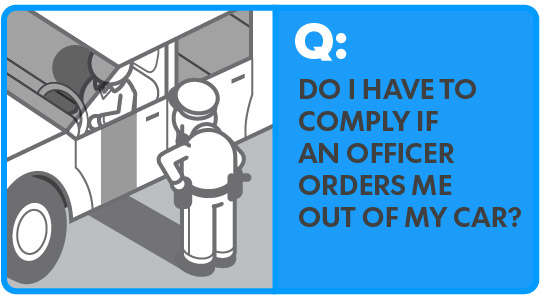Yes, they can. This issue was decided several decades ago in Pennsylvania v. Mimms (1977) that an officer may order a driver out of their car during a traffic stop. This means you do not have a choice. It does not matter if you are the most pleasant polite respectful person in the world. It does not matter if the weather outside is raining, snowing, or bitterly cold. Many people are surprised to learn that the officer does not have to give you a reason as to why they want you out. A lot of confusion seems to come from the constitutional right where a driver can refuse a search of your car. The courts have sated clearly that these two issues are not the same.
But what about my rights against unreasonable seizures?
The heart of any analysis regarding the fourth Amendment (seizure in this issue) is reasonableness of the government’s action. The reason for this is that the fourth Amendment establishes the rights against unreasonable search and seizures not reasonable search and seizures.
The United States Supreme Court stated that reasonableness depends “on a balance between the public interest and the individual’s right to personal security free from arbitrary interference by law officers.”
What the court has held is that:
“once a motor vehicle has been lawfully detained for a traffic violation, the police may order the driver out of the vehicle without violating the Fourth Amendment. Because the government’s legitimate interest in officer safety outweighs the de minimis additional intrusion of requiring a driver, already lawfully stopped, to exit the vehicle.”
Furthermore, a driver once outside the stopped vehicle, may be patted down for weapons if the officer reasonably concludes that the driver might be armed and dangerous.
What happens if you refuse to get out?
If you are asked or ordered to get out of the car and refuse, then police will regard that as resisting arrest and officers are justified in using reasonable force to affect the arrest. In other words, the police can and will force you out of the car and are protected by the law in these actions.
Do passengers have to get out if ordered?
Yes, passengers have to get out of the vehicle if asked by an officer. In Maryland v. Wilson, the Court held that “the Mimms rule applies to passengers as well as drivers, based on the same weighty interest in officer safety.”
A passenger once outside the stopped vehicle, may be patted down for weapons if the office reasonable concludes that that the driver might be armed and dangerous.
Charleston Criminal Defense Lawyer
What’s important to remember whether you are a driver or passenger is that you still have the right to remain silent and an attorney. Call an experienced and trusted Charleston criminal defense attorney at the Dale Savage Law Firm today for a free case consultation (843) 530-7813.

